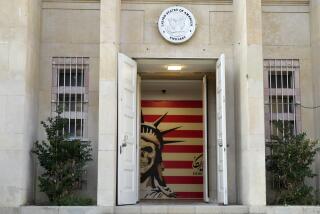‘Peacemakers’ Are Aiding Hussein : Citizen diplomacy: Self- credentialed emissaries trek to Baghdad, where they are eagerly seized on by Iraqi propagandists.
- Share via
The presence of former heavyweight champion Muhammad Ali in Iraq may seem an insignificant event except for the fact that he was just the latest in a train of self-credentialed mediators bucking for Nobel Peace prizes who have flown off to Damascus to peddle their good offices.
These pilgrimages pose serious problems for President Bush and great opportunities for Saddam Hussein, for the longer the gulf crisis continues without resolution, the more the would-be middlemen will come to represent to the Iraqi dictator the soft underbelly of American public opinion.
The inaugural visit was made by Jesse Jackson, who hoped, perhaps, to pull off another spectacular prisoner release like the one he engineered with the Syrians, after they shot down a U.S. Navy pilot during the American military involvement in Lebanon. Jackson was followed in Baghdad by an assortment of free-lance plenipotentiaries that included rock singer Cat Stevens, a convert to Islam who had enthusiastically echoed the Ayatollah Ruhollah Khomeini’s call for the slaughter of novelist Salman Rushdie. Former Atty. Gen. Ramsey Clark made the trip in his trademark corduroy jacket and seemed to suggest that Saddam Hussein is really quite a reasonable guy who simply has a beef with the United States. The implication is that the President of the United States is truculent and bloody-minded and just spoiling for a fight.
The pattern for this loose-cannon diplomacy was established during the Iran hostage crisis when a succession of Westerners went to Tehran to atone publicly for all the indignities, real and fancied, that the United States had heaped on Iran and to join the miserable captives for a round of Christmas carols.
Kurt Waldheim visited Iran in his capacity as secretary general of the United Nations and was almost lynched by a mob. Clark fancied that he had some credibility with the abductors because of a career spent in public penance for having served as Lyndon Johnson’s attorney general. He was followed by a throng of dissident U.S. clerics who disgraced themselves by playing into the hands of the captors.
It seems that all you need today to suit up as a mediator is the price of a ticket to Baghdad and some flimsy, self-conferred title such as “peace activist.” These will virtually guarantee an audience with the dictator, who will use your presence to proclaim to the world that Iraq has no quarrel with the American people, just its imperialistic government and mad-dog President. It’s a cinch that the longer the standoff continues, the more likely we are to see these aspiring Henry Kissingers jaunting off to Baghdad. And as Iraqi propagandists seize eagerly on these events and crank out videotape that shows Americans shaking hands with this thuggish dictator, the greater is the likelihood that some simple souls in this country will demand that we see the crisis from Hussein’s point of view.
It may be time to dust off the Logan Act and encourage the Department of Justice to prosecute these meddlers who are fostering in Saddam Hussein some dangerous illusions about American opinion. The act, passed by Congress in 1798 in response to the private diplomacy of a Philadelphia doctor named George Logan, was designed to forbid just the kind of amateur statecraft that seems to be so fashionable in dissident circles today. Both the radicals of the French Directoire in 1798 and the regime of Saddam Hussein hoped to manipulate unofficial American emissaries to drive a wedge between the American people and their government.
If Hussein wants to jerk our chain, let him at least not be assisted in the maneuver by American hands. Diplomacy may be too important to be left solely to diplomats, but it is surely too critical to be impeded by a bunch of dabblers whose private agendas may be quite incompatible with the best interests of the United States and whose activities may suggest falsely to Hussein that our domestic debate over the proper course to take in the gulf crisis is a weakness that he can exploit.
More to Read
Sign up for Essential California
The most important California stories and recommendations in your inbox every morning.
You may occasionally receive promotional content from the Los Angeles Times.










